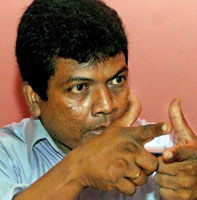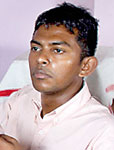On July 29, they flocked to Colombo. Over 1500 citizens of Sri Lanka, of every race and religion, from all parts of the country—some coming from as far as Jaffna, to lobby for the basic human rights they have been denied.
The protestors; the completely deaf of Sri Lanka, who have suffered in silence for decades due to misguided perceptions about their disability.
The reason they are misunderstood is simple though with dire consequences. They have been clumped together with those who are hard of hearing.
 |
President SLCFD H. G. Sarath Kumara: Don’t lump us with the hard-of-hearing.
Pix by Sanka Vidanagama |
“There’s a difference between those who are hard of hearing and those who are completely deaf; we have different needs,” explains the president of the Sri Lanka Central Federation for the Deaf (SLCFD), H. G. Sarath Kumara.
Those who are hard of hearing have devices such as hearings aids to amplify sound, however no hearing device is of use to those who are completely deaf. “So the government thinks, ‘if they [the hard of hearing] can do it why not you’, and they don’t support us,” he adds.
For the completely deaf, their only means of communication is sign language, and in Sri Lanka it hasn’t got them far; or anywhere at all. With so few facilities for the deaf available, they find it difficult to get by without an interpreter beside them. Whether learning in school or communicating with people, they are helpless.
Their lack of education restricts them to labour-oriented occupations. Speaking about his own experiences Sarath says, “When I was in school I had to just copy what was on the blackboard. There was no one who could offer an explanation in sign language, so I often didn’t understand what I was writing or what certain words meant. So I was only able to study up to grade 10.” With schools and universities lacking in lecturers who are proficient in sign language, several completely deaf people who have the potential to excel in their higher studies are denied this chance, leaving them with no option but to work in garment factories, as carpenters or in other labour-intensive jobs.
“We want the government to legislate sign language in Parliament and introduce sign language to schools. The teachers must use sign language to educate the students. If they are graduate teachers at deaf schools they must learn sign language,” Sarath stresses.
The SLCFD has fought a lone battle but the Department of Social Services has remained immune to their efforts. “The SLCFD requested us to train people ourselves. We are proficient in sign language and our members can be resource people, but they wanted a certificate,” Sarath says. “We asked them from where we could get a certificate. There’s no place in Sri Lanka where we can acquire a certificate of training in sign language. But they insist on a paper certificate.”
The sad statistic is that of a population of 20 million, of which more than 70, 000 are hearing impaired, there are only three qualified sign language interpreters in the whole of Sri Lanka. “The reason is, in Sri Lanka we don’t have a place where people can learn sign language or have sign language interpreter training. For example, Bernadine,” he gestures at the lady interpreting the signs he makes during the interview, “she became an interpreter because her parents were deaf. And usually people are not aware of the value of sign language. So we think that the government should have a responsibility in introducing sign language. The government must accept the people who use sign language and work as interpreters. They must collaborate with them and make a start. That’s the reason we had the protest.”
Their protest was meant to be a peaceful march. They hoped to show the nation the difficulties they’ve had to live with, as they walked to the President’s House to deliver their petition. Even though they had given advance notice of their march, they were stopped by the police. This time they were not willing to yield. After much discussion the police allowed them to meet with the President’s Additional Secretary but they were only given an assurance that their issue would be discussed with the President. Their petition was accepted 10 days later (August 9) for the President’s perusal.
Now they wait patiently, hopeful of a positive response from the government. Having brought up the issue annually on the International Day of the Deaf, they have been overlooked repeatedly. Unable to pay the rent of their office they had previously made a request to the government for a building but that too was disregarded. “The deaf people had till collections, lottery tickets and the deaf members contributed whatever they could. We were able to purchase a land in Seeduwa. But now we are unable to put up a building there because we don’t have the funds. We went back to the government saying we have the land and asked if they can help us build an office. But we received no support.” Sarath makes a plea to the public asking for donations or help in any way to build their office. “It will be beneficial to the deaf as well as the hearing impaired because it will help them learn sign language. It will be a house for the deaf people. We are hoping to conduct training in sign language as well there.”
Decades of being disregarded and denied, the deaf in Sri Lanka have lived restricted lives. Even though they are lack the ability to communicate through speech and hearing, they are highly capable and talented individuals who simply want the rights they been given according to the Parliamentary Disability Act 28.
Deprived of livelihoods
Mangalika Ranjani separated from her husband when her daughter, who is also deaf, was young. When her husband stopped paying child support she went to the police but was faced with the insuperable barrier in her life- communication.
 |
 |
| Mangalika Ranjani |
W. A Wasantha |
“When I went to the police to make a complaint they couldn’t understand what I was saying and those days we did not have interpreters so I couldn’t do anything about it. So after that I gave up on my husband’s child support. I started sewing to provide for her and myself. My daughter is 21 years now,” says Mangalika.
She says that communication has been a fundamental problem throughout her life up as she found it difficult to communicate with her family and the hearing community, and so she kept away from the outside world, sticking to the confines of her home. “I didn’t know how to bring up my daughter because she too was deaf. After I joined the organisation [SLCFD] they told me to send her to school and now she has sat for her O/L at which she received 4 S’s. It’s difficult for her to sit for her A/Ls.”
Mangalika’s daughter’s ambition is to work in a bank, but she was turned her away as they said they couldn’t accept her as she could not communicate. She now attends vocational training in Narahenpita.
W. A Wasantha (22) works at the SLCFD, having been offered a job on the strength of his graphic designing skills. He is currently working on the compilation of the 2nd edition dictionary of sign language.
Like Magalika’s daughter, finding employment was Wasantha’s main difficulty. “Those whom I approached would say ‘oh, you’re deaf. We can’t recruit you’,” he says. “My father has a motorcycle, I can ride it and I can also drive. My brothers have vehicles but they won’t even let me touch their cars because I’m deaf; even though it’s unrelated.”
He stresses that because he’s deaf he is more attentive to what’s happening around him and the mirrors on the vehicles allow him to see vehicles behind him.
The President of SLCFD, mentions that during former President Premadasa’s time, the RMV issued driving licence for the deaf and there were about 20 to 25 deaf people with licences but that too has stopped. |




